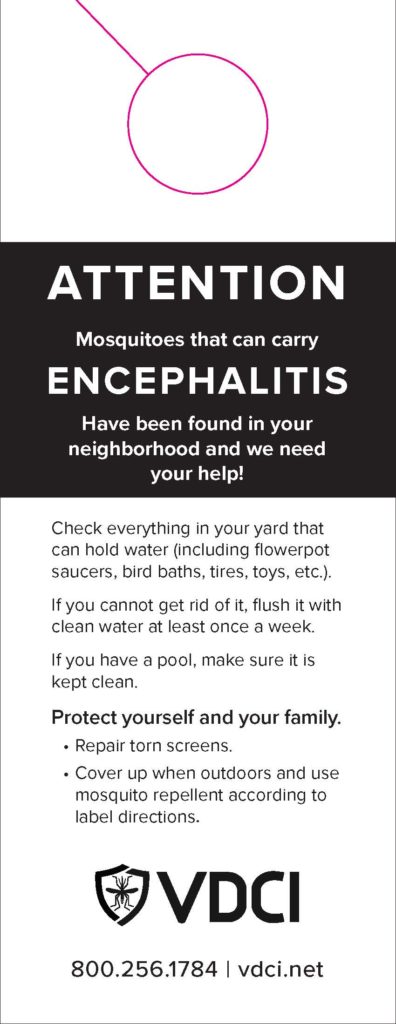Encephalitis Notifications
 What is an Encephalitis Notification?
What is an Encephalitis Notification?
As a result of mosquito disease surveillance in your area, you may receive a notification on your door. These notices are distributed when there is a high risk of mosquito-borne disease in your community.
What does the notification mean?
An encephalitis notification found on your door means that mosquitoes whose bites can result in West Nile virus or other encephalitis illness have been found within a five-block radius of your location.
Encephalitis notifications are generated when a mosquito or bird blood sample from a vector control company such as VDCI tests positive for the disease. The notifications may also be distributed when a state authority notifies us of a positive test in humans or other animals.
What can you do to decrease your risk?
While VDCI has a specific protocol to respond to encephalitis when it is detected, preventing disease spread requires that everyone pitch in. For homeowners and businesses, taking simple steps to reduce the risk of mosquitoes breeding in and around your property is critical.
Click here to download your encephalitis notification door hanger
Follow These Steps To Keep Your Property Safe:

1. Inspect your property to remove standing water, which is attractive to mosquitoes for breeding.
Even the smallest item holding water can be a problem – mosquitoes need as little as a tablespoon of water to breed. Empty water from items such as flowerpot saucers, birdbaths, tires, toys, buckets, garbage cans, etc. If you can’t eliminate standing water, flush it with clean water at least once a week.
2. If you have a pool, make sure that it is cleaned regularly.
Use automatic pool cleaners or agitators to help keep the water clean and moving.
3. Keep mosquitoes out of indoor areas.
Be sure that all doors and windows fit tightly. Repair torn window screens. Don’t leave doors or windows without screens open.
4. Protect yourself and your family by reducing your exposure to mosquito bites.
If possible, limit the time spent outdoors, especially at dusk and dawn – this is the time when mosquitoes are most active. Cover exposed skin when outside. Consider the use of mosquito repellent and be sure to follow all label directions. For recommendations on mosquito repellent, visit the U.S. Environmental Protection Agency’s website.
5. Protect your pets from mosquitoes.
Mosquitoes can also spread diseases to your family pets. Mosquito bites can cause heartworm in dogs and cats, although cats are not at as great of a risk as dogs. Dogs and cats can also contract West Nile virus. Horses are also very susceptible to mosquito-borne diseases such as Eastern equine encephalitis, Western equine encephalitis, Venezuelan equine encephalitis, and West Nile virus. Speak to your veterinarian for the best course of action to protect your pet.
 Since 1992, Vector Disease Control International (VDCI) has taken pride in providing municipalities, mosquito abatement districts, industrial sites, planned communities, homeowners associations, and golf courses with the tools they need to run effective mosquito control programs. We are determined to protect the public health of the communities in which we operate. Our mosquito control professionals have over 100 years of combined experience in the field of public health, specifically vector disease control. We strive to provide the most effective and scientifically sound mosquito surveillance and control programs possible based on an Integrated Mosquito Management approach recommended by the American Mosquito Control Association (AMCA) and Centers for Disease Control and Prevention (CDC). VDCI is the only company in the country that can manage all aspects of an integrated mosquito management program, from surveillance to disease testing to aerial application in emergency situations.
Since 1992, Vector Disease Control International (VDCI) has taken pride in providing municipalities, mosquito abatement districts, industrial sites, planned communities, homeowners associations, and golf courses with the tools they need to run effective mosquito control programs. We are determined to protect the public health of the communities in which we operate. Our mosquito control professionals have over 100 years of combined experience in the field of public health, specifically vector disease control. We strive to provide the most effective and scientifically sound mosquito surveillance and control programs possible based on an Integrated Mosquito Management approach recommended by the American Mosquito Control Association (AMCA) and Centers for Disease Control and Prevention (CDC). VDCI is the only company in the country that can manage all aspects of an integrated mosquito management program, from surveillance to disease testing to aerial application in emergency situations.

